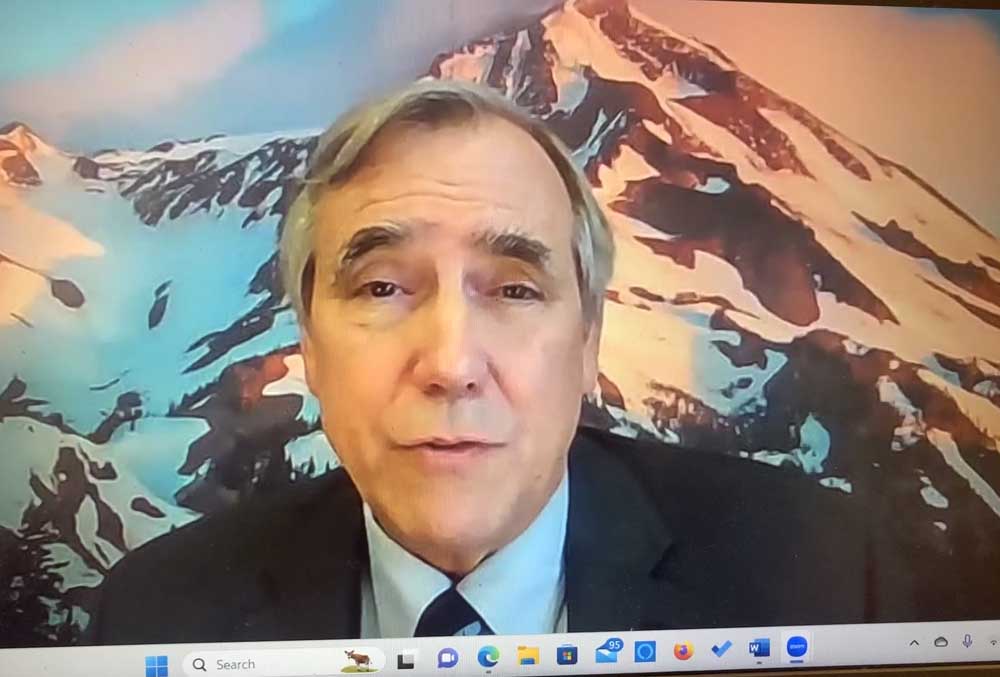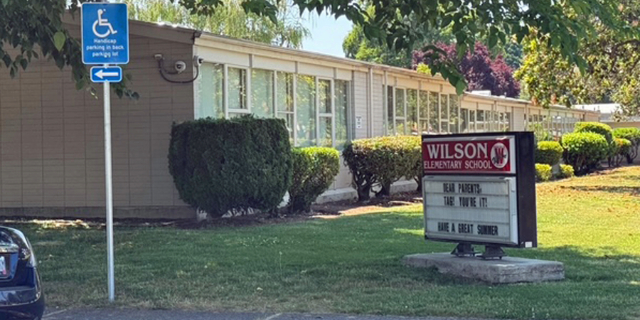Sen. Merkley slams Postal Service ‘snow job’ on local operations, seeks funding freeze
Published 5:30 pm Wednesday, October 18, 2023

- Sen. Jeff Merkley, D-Oregon, speaks on a Zoom call Wednesday morning about efforts to oppose a U.S. Postal Service planned consolidation and downsizing of local operations.
Oregon Sen. Jeff Merkley announced a bipartisan effort Wednesday opposing plans by U.S. Postal Service officials to consolidate mail operations in Portland and downsize operations in Medford and Eugene.
Merkley’s office issued a letter Wednesday, signed by several senators and members of Congress, including Rep. Cliff Bentz, R-Ontario, denouncing consolidation plans and calling for a prohibition of spending of government funds by the U.S. Postal Service to “convert a Processing and Distribution Center to a Local Processing Center.”
The statement comes after a months-long process by the Postal Service that sought input to proposed plans and spurred public demonstrations by local postal workers. American Postal Workers Union Local 342 has protested in recent months at Medford, Central Point and Grants Pass post office locations and staged a demonstration outside Bentz’s Medford office in mid-September.
A packed house at a community meeting at the Hilton Garden Inn in Medford in August drew an audience of 80-plus — including postal workers and concerned community members — who spoke entirely in opposition to the proposed changes.
Merkley, D-Oregon, said he adamantly opposes any negative impact to service levels.
“Imagine you’re going to be mailing a letter to someone a block over, but it first has to go up to Portland to be processed and come back,” he said in a Wednesday Zoom call.
“Of course, that’s going to slow down the delivery of mail enormously. It’ll slow down business operations and things you send through the mail. … It will affect drugs being delivered in a timely fashion for our seniors and for everyone. … We need to keep a functioning high quality Postal Service. We’ve had the best in the world, but some of these decisions are really degrading it. They’re unacceptable.”
The planned changes impact regional facilities in Medford and Eugene, as well as two facilities in Georgia. In addition to Merkley, Sens. Ron Wyden, D-Oregon, and Raphael Warnock, D-Georgia, signed the letter, along with Bentz; Rep. Val Hoyle of Oregon, a Democrat; Republican Rep. Austin Scott of Georgia; and Rep. Sanford Bishop Jr., a Georgia Democrat.
The letter stated: “Shrinking processing facilities outside of the largest urban centers will undoubtedly lead to decreased service standards, slower delivery times and fewer career and non-career positions serving residents outside of the largest population centers in our states. Over the past few decades, rural and small urban communities in our states and districts have seen their postal facilities consistently scaled down and consolidated with processing operations in highly populated areas. While we understand that the U.S. Postal Service is facing financial difficulties, we are concerned that converting P&DCs in suburban and more rural areas into LPCs could lead to service disruptions particularly impacting rural families and businesses.”
While planned changes call for a distribution facility on Sage Road in Medford to lose 17 “craft,” non-career positions and one management position, Jeremy Schilling, president of APWU Local 342, said planned cuts call for the loss of 37 local positions, with 20 new positions added back at a Portland facility, making the number of cuts appear to be fewer. Schilling commended Merkley’s stance on the planned reductions and said the recent public process was a mere formality.
“They made their plan from the beginning. They built a fake house of cards, and they allowed public input and said, ‘Sure we’ll respond to your comments,’” Schilling said in an interview.
“We were all at the public hearing, and there were no answers to the questions asked prior to, or during, the meeting. There’s been no communication since they released their plan. … Actually, I’m sure that (consolidation) document bore signatures before it was even released. … I’m really happy to hear we have support, and I’m really hopeful for what Merkley’s doing.”
Postal Service officials did not immediately respond to a request for comment.
In a previous email to the Rogue Valley Times, Postal Service spokeswoman Kim Frum stated, “The facilities will remain open and modernized, and there will be no career layoffs as part of this initiative and no impacts to local customer and retail service. … The new Medford and Eugene Local Processing Centers and the Portland Regional Processing and Distribution Center are critical nodes in our network transformation plan. As part of this work, our goal is to reach 95% on-time delivery for all mail products.”
Merkley agreed with Schilling that input provided by community members had not been considered. He reiterated concerns about reduced operations at Medford and Eugene facilities.
“We sent a letter to get answers on things like how long the mail would be delayed and so forth, and we got the most completely bogus answers back,” Merkley said.
“It was like, ‘Oh, it’ll have no impact.’ Well, how can it have no impact if your letter to your neighbor, who lives a couple streets down, has to go to Portland and come back? So, it’s a complete snow job, and I hope we can stop this change.”
For more information see, usps.com/what/strategic-plans/mpfr/documents/fact-sheet-408s.pdf
Editor’s note: This article has been updated to reflect that Rep. Val Hoyle is from Oregon.
Sen. Jeff Merkley, D-Oregon, said Wednesday he was preparing to introduce his Medical Debt Relief Act to address “significant long-term damage caused by derogatory marks that scar credit scores for years, even after the debts have been paid off.”
Previously, Merkley said he supported legislation to remove paid-off medical debt from credit reports in addition to preventing medical bills smaller than $500 from being included in reports.
“The Oregon Health Authority has found that one-third of Oregon families are struggling with medical debt. A lot of that is illegitimate debt, because insurance companies, the first thing they do … when you send a bill to them is say, ‘Oh, we don’t cover that.’ So, you have to fight them, and you have to sometimes fight them for months or years,” Merkley said.
“Meanwhile, that goes on your credit report and damages your ability to buy a house or buy a car, or it increases the interest rates on your credit card. That is just a messed up and unfair system, so we need to get medical debt off the credit reports.”
A side effect of credit reporting practices in regard to medical debt, Merkley said, is a reluctance to seek needed medical care.
“It means that families and individuals are declining medical care they need for fear of the debt and the debt reporting, so this is truly egregious,” he said.
“I’m going to do all I can to get the medical debt out of our credit-reporting system,” the senator said.






